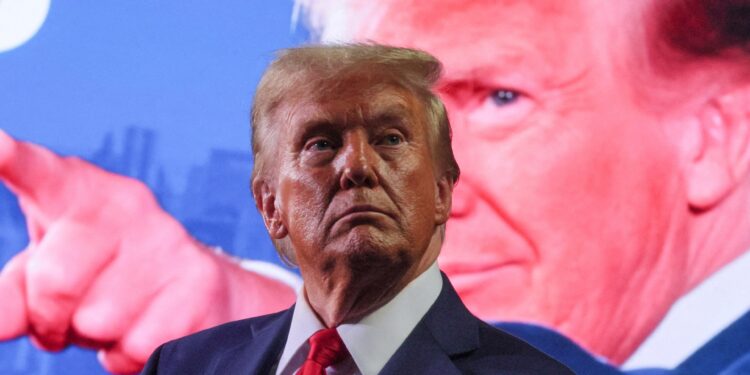11/26/2024–|Last updated: 11/26/202402:19 PM (Mecca time)
US President-elect Donald Trump confirmed that his first economic measures after his inauguration will be to increase customs duties on products imported from China, as well as Canada and Mexico, in decisions he attributed to the crises related to opioids and immigration.
In a post on his account on his social media platform (Truth Social), Trump wrote, “On January 20, in one of the first of many executive orders that I will issue, I will sign all necessary documents to impose tariffs on Mexico and Canada of 25% on all their products imported into the country.” US”.
He added, “These fees will remain in effect until the invasion of our country by drugs, especially fentanyl, and all irregular immigrants stops!”
China
In a separate post, the US President-elect wrote that he would also impose on China additional customs duties of 10%, in addition to the current duties, and those that he may decide in the future, “on all the many goods coming from China to the United States.”
He explained that he often discussed the problems of drug entry, especially fentanyl, which is one of the main substances responsible for the opioid crisis in the United States, with Chinese officials who pledged to punish “smugglers” strictly “up to the death penalty,” but they “did not accomplish that,” he said. .
Countries can rely on national security arguments for not respecting the rules specified by the World Trade Organization, but countries are usually reluctant to resort to this exception as a means of controlling trade policy.
Increasing tariffs – which he often described as his “favorite phrase” during his election campaign – constitutes one of the main pillars of the president-elect’s upcoming economic policy. Trump does not hesitate to revive trade wars, especially with China, which he initiated during his first term in the White House.
During that period, he justified this policy by the trade imbalance between the two countries and Chinese trade practices, which he considered unfair, accusing Beijing of theft in terms of intellectual property.
China responded by imposing tariffs that had negative repercussions on American farmers in particular.
The administration of outgoing President Joe Biden maintained some of these tariffs on Chinese products, and imposed other fees targeting additional goods.
The Chinese Foreign Ministry warned on Tuesday, after the US President-elect’s statement, “that no one will win in a trade war.”
Liu Bingyu, spokesman for the Chinese Embassy in Washington, said in an email received by Agence France-Presse, “China considers that economic and trade cooperation between China and the United States is inherently mutually beneficial.”
Many economic experts warn that increasing customs duties will harm growth and increase inflation rates, as these additional costs will initially be borne by importers of these goods, who will often later pass them on to consumers.
But those close to the president-elect confirm that tariffs are a useful bargaining chip used by the United States to force its trading partners to submit to its terms.
Warning of enormous danger to Canada
On Monday evening, the Canadian government said that the relationship between the two countries is “balanced and provides mutual benefit, especially for American workers,” and referred, in a veiled warning, to its “essential role in American energy supplies.”
This news had a shock effect in a country where 75% of its exports go to the United States. The Prime Minister of Quebec, François Legault, saw this announcement as a “tremendous danger” to the Canadian economy.
His counterpart in British Columbia, David Eby, said, “Ottawa must respond firmly.”
The day after the US presidential vote, Mexican President Claudia Sheinbaum sought reassurance by saying that Mexico had “no reason to worry.”
The three countries have been linked for 30 years to a free trade agreement that was renegotiated under pressure from Donald Trump during his first term.
Wendy Cutler, vice president of the US think tank Asia Society Policy Institute, said: “Mexico and Canada still depend heavily on the US market, and therefore their ability to ignore President-elect Trump’s threats remains limited.”
Threat followed by negotiation
However, analyst William Wrench pointed out that the agreement between these countries would have been renegotiated in 2026 in any case, stressing that “this is a classic Trump position: a threat followed by negotiation.”
It is noteworthy that Trump’s choice of Howard Lutnick, Chairman of the Board of Directors of the Investment Bank Cantor Fitzgerald, to assume the position of Secretary of Commerce (known for his criticism of China), confirmed the President-elect’s determination to put pressure on his trading partners to obtain better trade agreements and return production factories to the United States.
Regarding China, Trump promised to impose customs duties that could reach 60% on some products, and 200% on imports of cars assembled in Mexico.
He also wants to re-impose customs duties ranging between 10% and 20% on all goods entering the United States, and the European Union has announced that it is “ready to act” in the event of new trade tension.
Economists warn of the inflationary repercussions of raising customs duties in this way.



